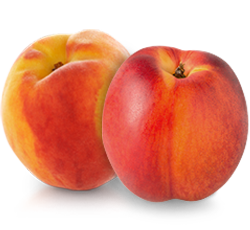STORAGE & HANDLING
Ontario peaches & nectarines
Growers, shippers and merchandisers agree the least amount of handling is best. Upon delivery, promptly inspect peaches and display the most mature immediately, code-date the less mature fruit.
Temperature/Refrigeration
Temperature is the most critical factor. Ripe peaches will keep well if stored at 32°F (0°C)
Keep peaches refrigerated 32°F (0°C) if not displaying immediately as this will slow ripening. Relative humidity for storing peaches is 95%, as this will slow shrivelling. Do not expose peaches to cold air blasts from refrigeration units as peaches freeze quickly. Storage life for ripe peaches at 32°F (0°C) is 7 to 10 days.
Colour = Quality
A green background colour suggests the peach was immature when picked and may not ripen well. These can become shriveled or flabby and have tough, poorly flavoured flesh. Peaches that exhibit large, flattened bruises will not ripen well.
A deep reddish-brown colour, softening of the fruit or a slight shriveling of the skin at the stem end indicates over ripenness.
A bright, fresh appearance with a yellowish or creamy background signifies a good-quality peach. The popular red "blush" may be present on peaches in varying degrees depending on the variety, but it is not a sign of maturity. Sound peaches will be free from damage such as bruises. The peach is a member of the rose family and should have a pleasingly sweet fragrance. Peaches should be soft to the touch, but not mushy. Look for a well-defined crease that runs from the stem to the point.
CARE & STORAGE FOR ONTARIO TENDER FRUIT:
Ontario tender fruit is exactly that tender. Peaches, plums and pears demand proper care and storage in order to maintain their quality. Fresh bright colours of properly ripened fruit are a natural draw for the consumerís eye. To ensure your merchandising displays are attracting the attention they deserve follow these simple guidelines:
1. Do not store tender fruit above 35 F (2 C); quickens ripening and can cause internal breakdown.
2. Avoid stacking baskets of fruit or rough handling.
3. Frequently cull displays for damaged fruit to prevent the spread of spoilage.
4. Ontario tender fruit is delicate, remember "the least amount of handling is best."
5. Pears produce and absorb odours [i.e. do not display or store near onions].
Food Safety
The Ontario tender fruit and grape industry has built its reputation by consistently supplying Canadian retailers with safe quality fruit.
The Ontario Tender Fruit Producers' and the Ontario Fresh Grape Growers' Marketing Boards, in conjunction with the Canadian Horticultural Council have adopted the Canada GAP OFFS (On Farm Food Safety) program based on the seven basic principles of the internationally-recognized HACCP (Hazard Analysis and Critical Control Point) approach.
For more information on the program please visit the CanadaGap website: www.canadagap.ca.






